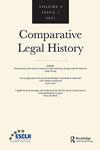国际法和历史政治
IF 0.5
Q2 LAW
引用次数: 0
摘要
一篇优秀的书评应该以简洁的陈述(最好是题词)开头,向读者传达他们即将阅读的书评的大致概念,并对作者介入的辩论进行简洁的总结,最好是在第一段内。然后,这种场景布置应该让位于有条理的论述,给出足够的理由,使研究生可以合理地认为这本书是“读过的”,或者让教授引用作者来支持这个或那个命题。只有在这个总结性的总结之后,评论者才会批判性地对待这本书,有时是作为一个主要的问题,但更多的时候是以一些小的方法论或经验上的诡辨的形式,然后尽职尽责地重申这本书为什么重要,即使评论者在这里或那里有一些疑虑。这是一篇书评的一般模板,读者可能期望其中的内容能够填补一个特定的功能。但是,这种传统的形式并不能说明评论内容的异质性——虽然有些评论是乏味的公式化的,但也有一些将学术论述推向了富有成效的方向。最好的公开重要的辩论,有时用崇高的修辞和理论的话语,更多的是用好斗的蔑视和抱怨的语气。但是,就像大多数读者一样,假设书评是这样那样的,因为它符合这样那样的惯例,这是忽视了这种类型固有的多样性,从而排除了许多富有成效的参与途径。这就是安妮·奥福德(Anne Orford)在她最近出版的著作《国际法与历史政治》(International Law and Politics of History)中对历史法学研究现状的评价所存在的问题。在这本书中,她倾向于将近代历史学术的实质与其形式混为一谈。通过将专业历史领域简化为几个基本特征,以服务于实现辩论功能,本文章由计算机程序翻译,如有差异,请以英文原文为准。
International law and the politics of history
A proficient book review should begin with a pithy statement (better yet, an epigraph) that conveys to readers a general idea of the kind of review they are about to read and an economical summary of the debate in which the author is intervening, preferably all within the first paragraph. This mise-en-scène should then give way to a methodical march through the argument, giving enough of a précis that a graduate student may reasonably consider the book ‘read’, or for a professor to cite the author in support of this or that proposition. Only after this general summation will the reviewer engage with the work critically, sometimes as a major problematic, but more often taking the form of a minor methodological or empirical quibble, before dutifully concluding with a reiteration of why the book is important even if the reviewer has some qualms here or there. This is the general template of a book review, the substance of which readers may expect to fill a particular function. But this conventional form says nothing about the heterogeneity of the content one finds in reviews – while some are tediously formulaic, a few push academic discourse in fruitful directions. The best open important debates, sometimes with lofty rhetoric and theoretical discourse, more often in tones of pugnacious defiance and grievance-airing. But in assuming that a book review is such-andsuch because it conforms to such-and-such convention – as most readers do – is to ignore the diversity inherent to the genre, thereby foreclosing many avenues of productive engagement. Such is the problem with Anne Orford’s assessment of the state of historical-legal research in her recent philippic, International Law and the Politics of History, wherein she tends to conflate the substance of recent historical scholarship with its form. By reducing the field of professional history to a few essential features in the service of fulfilling a polemical function,
求助全文
通过发布文献求助,成功后即可免费获取论文全文。
去求助
来源期刊
CiteScore
1.70
自引率
0.00%
发文量
20
期刊介绍:
Comparative Legal History is an international and comparative review of law and history. Articles will explore both ''internal'' legal history (doctrinal and disciplinary developments in the law) and ''external'' legal history (legal ideas and institutions in wider contexts). Rooted in the complexity of the various Western legal traditions worldwide, the journal will also investigate other laws and customs from around the globe. Comparisons may be either temporal or geographical and both legal and other law-like normative traditions will be considered. Scholarship on comparative and trans-national historiography, including trans-disciplinary approaches, is particularly welcome.

 求助内容:
求助内容: 应助结果提醒方式:
应助结果提醒方式:


